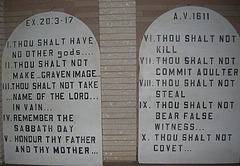 God established His covenant with the Jews, providing them with laws and Levites. They offered daily sacrifices to provide forgiveness and a limited access to God. Once a year the High Priest entered God’s presence, even if only metaphorically, in the Most Holy Place of the temple. The Jews did their best (sometimes) to keep the law God had established.
God established His covenant with the Jews, providing them with laws and Levites. They offered daily sacrifices to provide forgiveness and a limited access to God. Once a year the High Priest entered God’s presence, even if only metaphorically, in the Most Holy Place of the temple. The Jews did their best (sometimes) to keep the law God had established.
But it never worked. They vacillated between being failing strugglers to keep the law, hypocrites who only tried to keep the outward requirements of the law, and outright rebels against the law. Try as it might, the law couldn’t keep them in check. The Levites could not contain the people. In fact, the Levites themselves were sometimes leaders in the rebellion (cf. Nehemiah 13).
That was why something new was needed. “If perfection had been attainable through the Levitical priesthood…what further need would there have been for another priest to arise…” (Hebrews 7:11). Therefore, God set aside the former commandment because “the law made nothing perfect” (Hebrews 7:19). It was weak and useless, not because of God’s inability to make a good law, but because of man’s enslavement to sin. Over and again, we demonstrated that we would not keep a law.
Jesus was the only man who ever kept the law. However, God did not use Jesus as the great example that we could be perfect. He did not use Jesus as the example that we should be perfect. He did not use Jesus as the example that if we weren’t perfect, we only had one recourse: death. Instead, of demanding we step up to the plate and make ourselves perfect, He put Jesus to death that He might make us perfect by Jesus’ blood.
The blood of bulls and goats could never perfect the conscience of the worshiper (Hebrews 9:9). However, the blood of Jesus Christ can “purify our conscience from dead works to serve the living God” (Hebrews 9:14). Therefore, God has made Jesus the mediator of His New Covenant so that we may receive our promised eternal inheritance.
The great comfort we can take is that while neither the law nor the Levites could save us, Jesus Christ “is able to save to the uttermost, those who draw near to God through him, since he always lives to make intercession for them” (Hebrews 7:25). Here is the great thing. We don’t have to try to save ourselves (in this sense). We cannot. The law was given by which we could try to be our own savior. We could strive to follow its precepts and keep its rules. Maybe if we tried hard enough, we could be perfect and save ourselves. But we didn’t. We no longer have to rely on ourselves and our own strength. Jesus is our Savior. He is able to save us to the uttermost. We must simply strive to approach God through Him. Jesus will save us.
This week, let us simply lean on Jesus and let Him run our lives. He’ll lead us to our eternal inheritance if we’ll let Him.
 Sunday Morning In-Person Service is Canceled
Sunday Morning In-Person Service is Canceled